A month of writing and international idealism.
Competition in Foundation Model Markets
This month ended up being centred around ensuring the two briefings that were accepted by the T7 were developed into fully-fledged policy papers, with clear recommendations to bring forward to G7 leaders.
The first paper is on competition concerns in the foundation model market (think big AI models like ChatGPT that are trained on a massive amount of data and can perform a wide variety of tasks, contrasted with “traditional” models that are designed to have very narrow data outputs for specific tasks).
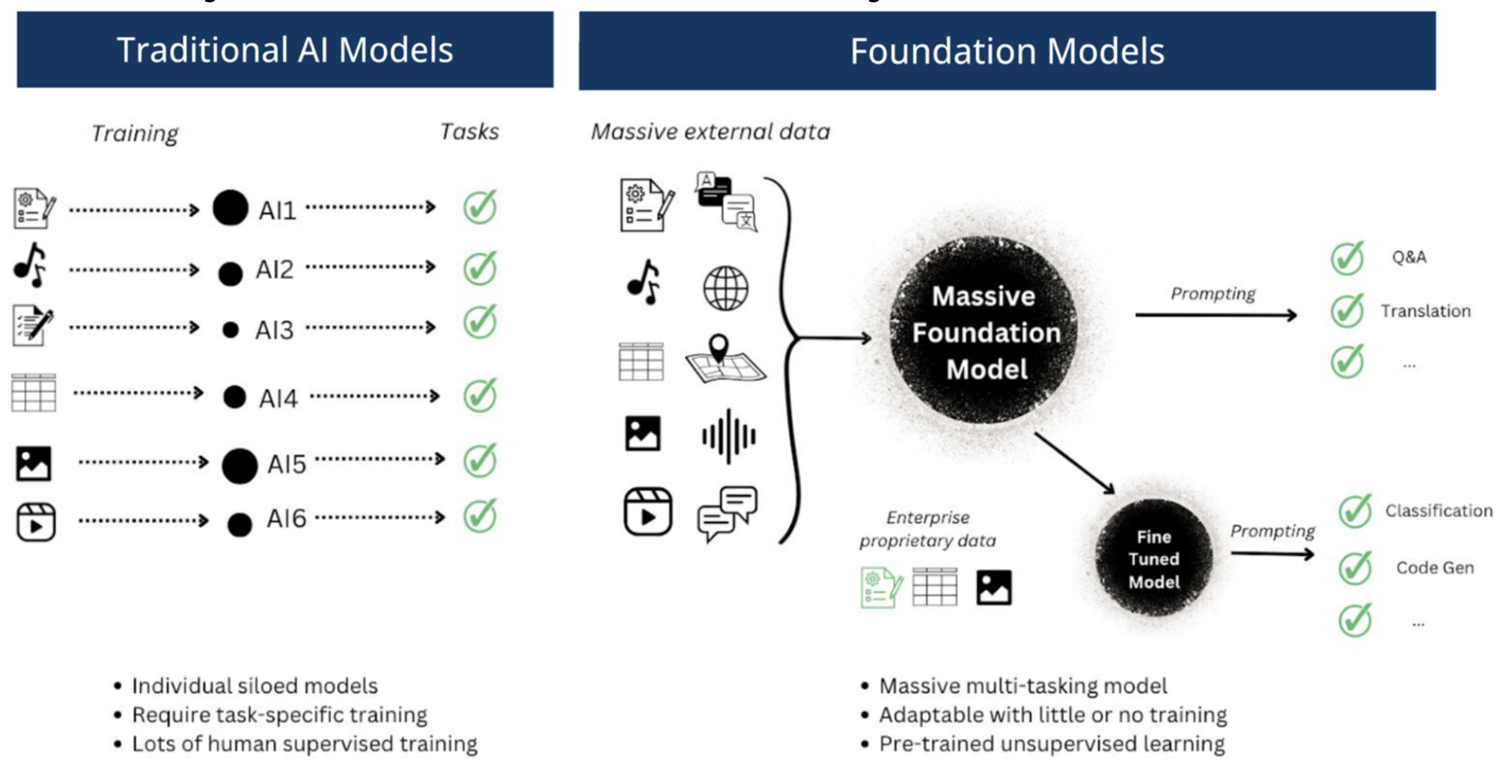 The difference between foundation models and traditional AI models, simplified.
The difference between foundation models and traditional AI models, simplified.
Why care about foundational model market competition? If you’re paying attention, the global economy is going through another technical revolution, this time centred around generating tools that can automate huge swaths of human labour – everything from design, to writing, to programming, and even research has the potential to at the very least be made significantly more efficient (read: require fewer man-hours to perform and thus require fewer people), if not be substantially replaced with generative models. Trying to stop this technology is as futile as any luddite revolt. The knowledge and tools to produce these are available for firms to play with as they desire, and no country in their right mind would shoot themselves in the foot and miss the economic boom over some distant fears about job loss.
This collective action problem requires long-term thinking and international action. Looking forward, it’s clear that whoever owns these tools will have disproportionate economic power, perhaps more-so than has ever historically been possible. The resulting risk of increased inequality and eroded democratic institutions is too high to ignore.
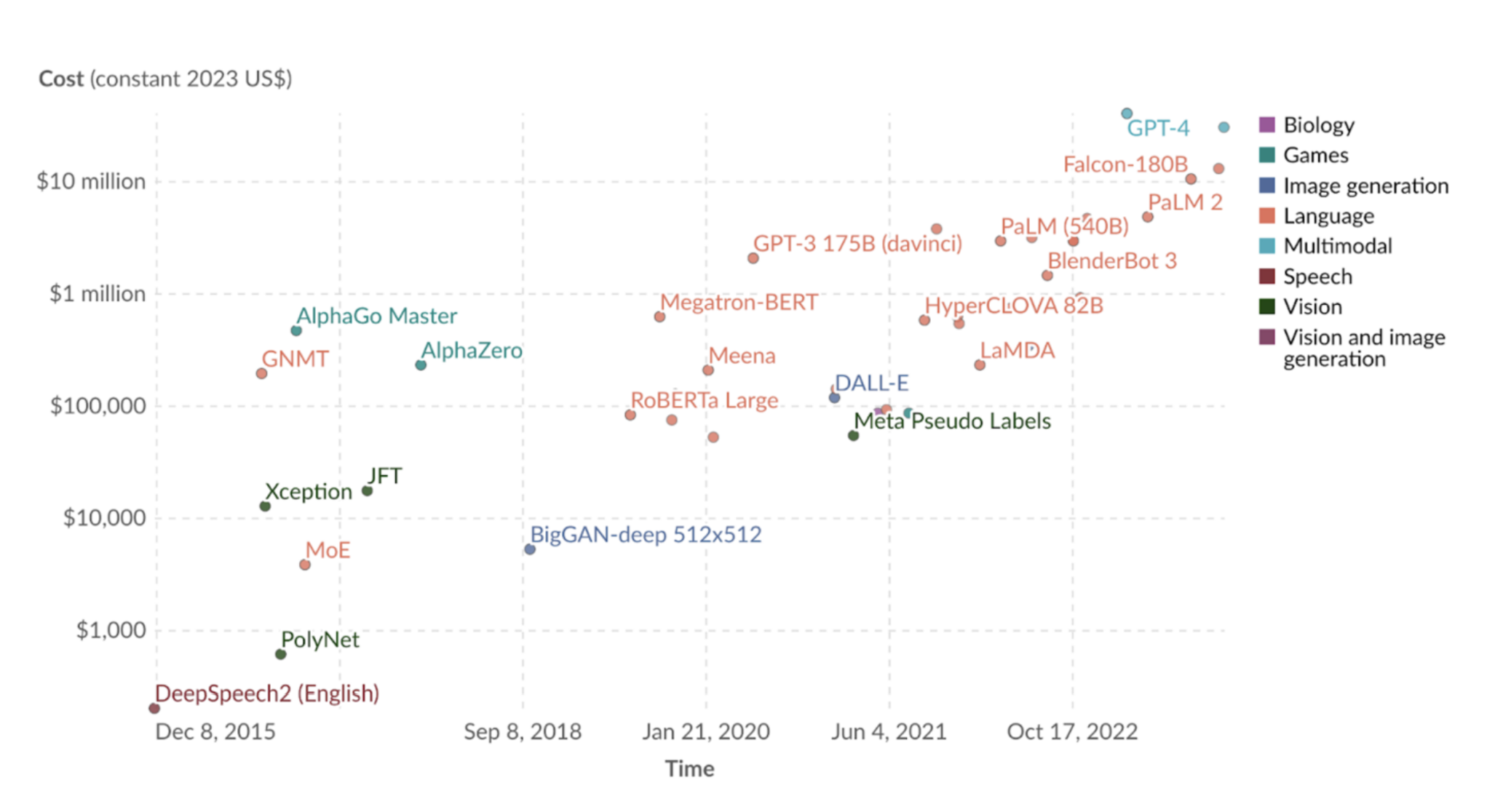 It’s getting more expensive to make better models. This benefits already-established players. No, DeepSeek does not disprove this trend.
It’s getting more expensive to make better models. This benefits already-established players. No, DeepSeek does not disprove this trend.
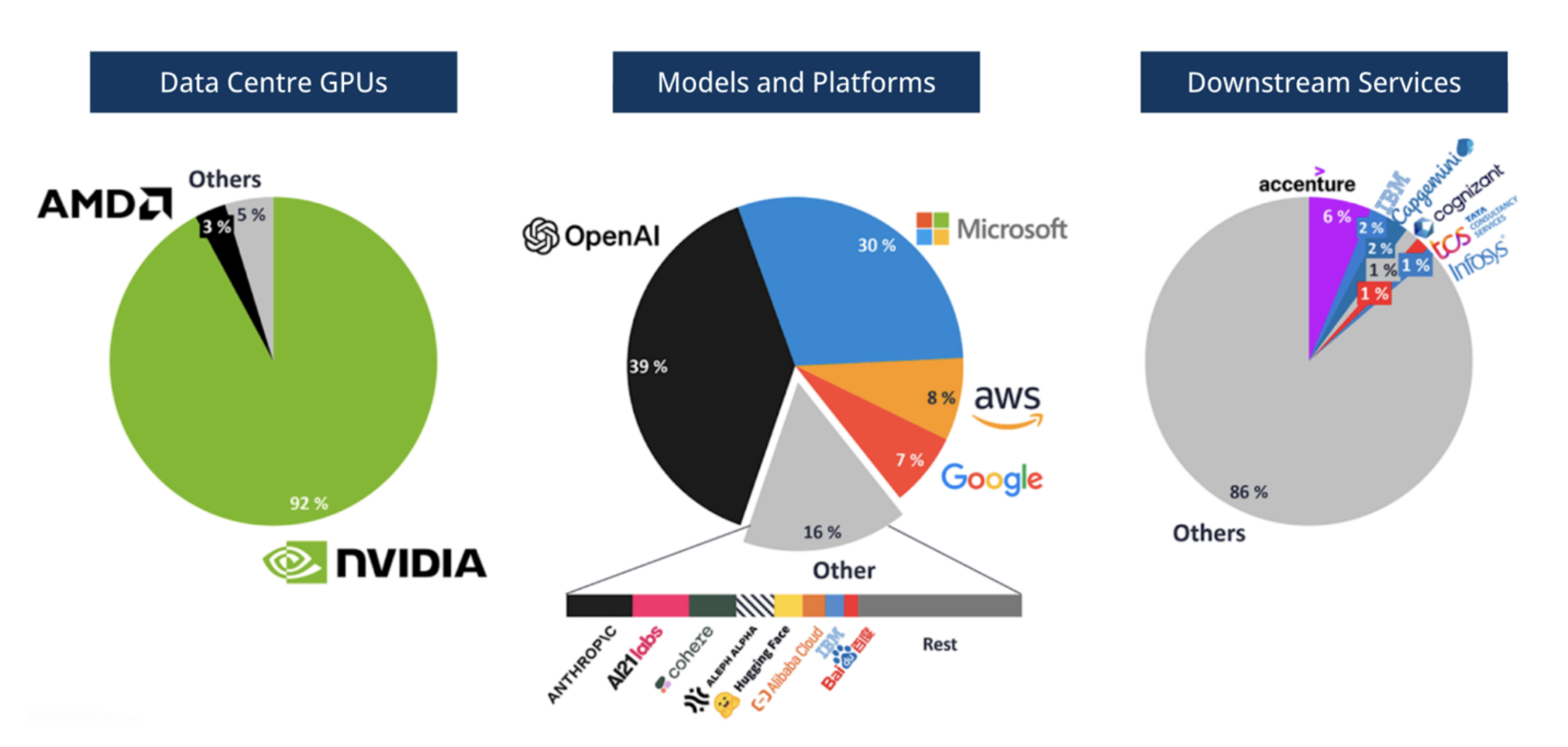 Foundation models and platforms are highly concentrated among small actors. The GPU market is entirely dominated by NVIDIA.
Foundation models and platforms are highly concentrated among small actors. The GPU market is entirely dominated by NVIDIA.
What can we do? Governments need to act now to increase scrutiny of AI mergers, acquisitions, and exclusive partnerships, enforce fair and equal access to GPUs and cloud resources — meaning access that is impartial and available to all companies on the same terms — mandate interoperability, and prevent exclusive deals that stifle competition in AI infrastructure.
Longer-term strategies involve funding publicly-owned compute resources and data, preventing governments from being entirely dependent on private companies as AI is increasingly integrated into government processes. Simply put: governments must be vigilant to prevent any single firm from gaining too much power in this new market.
I’m personally a bit of an accelarationist (I believe these tools have the potential for more good than harm), but it is asinine to ignore the economic realities of the foundational model market. Even in the best case scenario for AI, we essentially become pets – with no need to work and our needs catered to by systems beyond our comprehension. Is this a bad thing? For many, it might seem like paradise. Failure to build a new world order centred around reducing human suffering and increasing human potential in pursuit of profit to benefit a monopoly power would be a catastrophic loss.
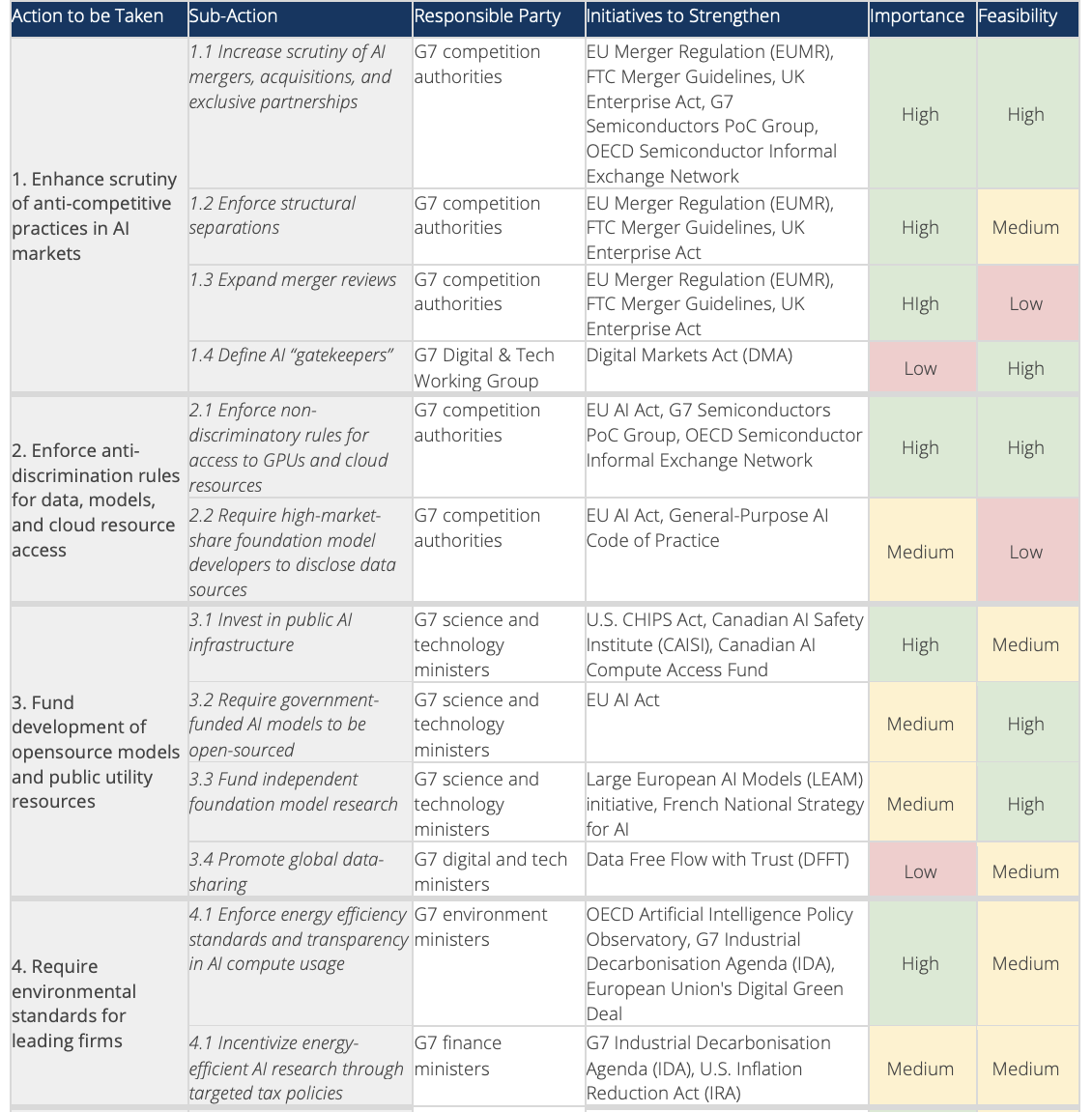 Our recommendations.
Our recommendations.
Rules as Code
Rules as Code is basically just the idea of writing government policies and legislations in a machine executable format (not just machine readable). This opens up a ton of avenues for better integrating government services with technology, from web portals that can instantly tell citizens which benefits they are entitled to (and sign them up), to online forms that can answer complex questions about tenants rights, to complex tax policy simulations that policymakers can use to simulate the consequences of proposed policies (and interactions with existing policies) before they are implemented. Basically, we are recommending that G7 countries do this.
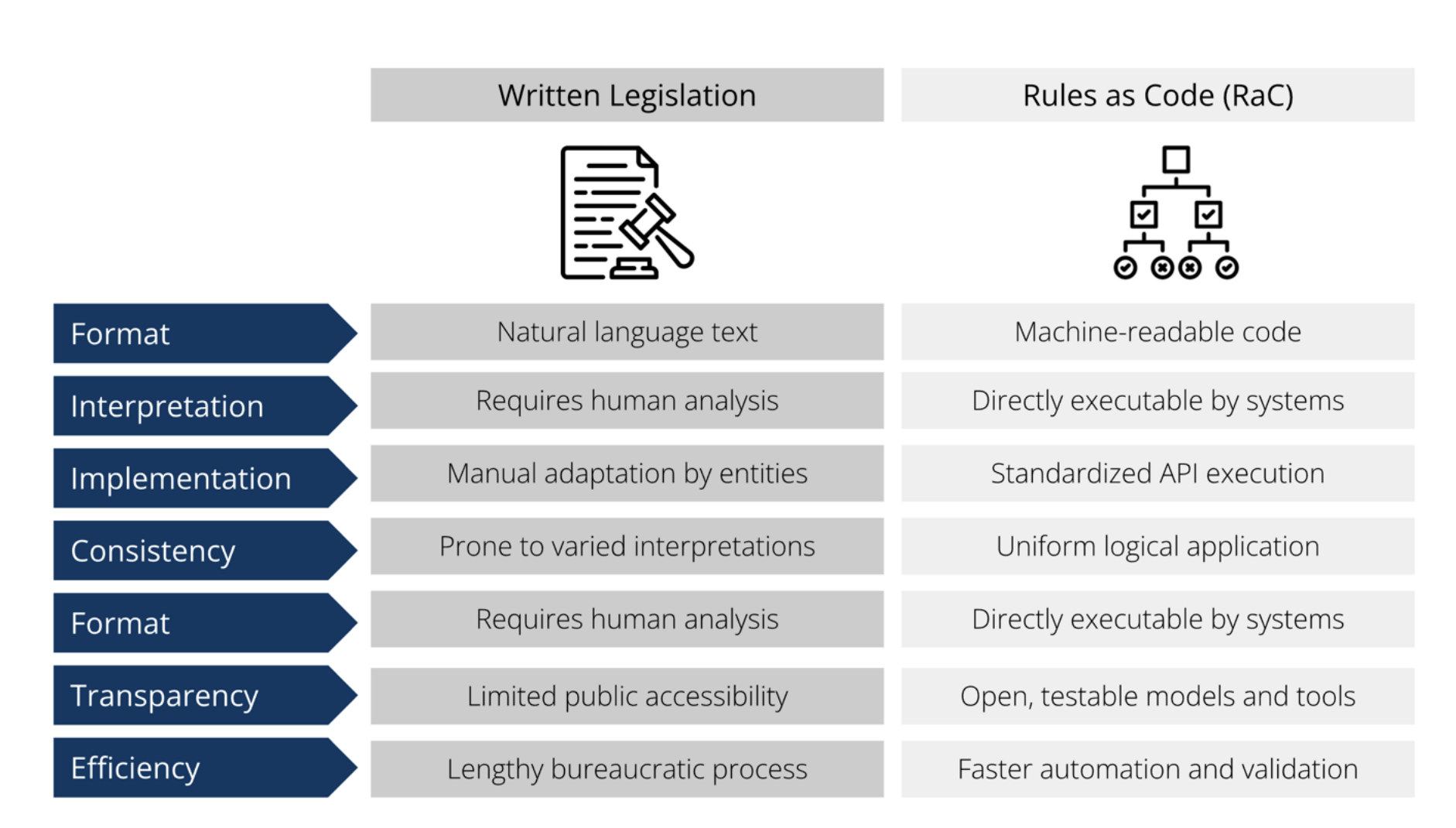 The difference between Rules as Code and written legislation, simplified.
The difference between Rules as Code and written legislation, simplified.
 Example of a “Rule as Code,” easily integratable into digital government services.
Example of a “Rule as Code,” easily integratable into digital government services.
Is this a very important recommendation? No. But it does have the potential to significantly increase the efficiency of various government programs and policies (see OpenFisca’s social benefit calculators for example). Since government efficiency is all the rage these days, we might as well do something that works.
 How RaC works to make governments more efficient, abstractified.
How RaC works to make governments more efficient, abstractified.
On the Ineffectiveness of International Governance
The beef emissions abstract (recommending that countries reduce subsidies to beef farmers in favour of lower emission protein sources) was not accepted. I tried quickly pivot to resubmit to the T20 (held in South Africa this year), but was not successful there either.
This was incredibly disappointing to me, this was objectively the most important recommendation given the existential risk of climate change (it also had by far the most highly qualified co-authors). I strongly suspect the reason it failed to be accepted by either the T7 or T20 was because this policy proposal is simply unpopular within the hosting countries (if only we submitted last year for the G20 in India). Both Canada and South Africa have significant beef industries with undoubtably powerful lobby groups and political influence that would make such a policy untenable.
Which begs the question, if an unpopular but important (and highly evidence-based) recommendation is rejected by the international governance collective, are the recommendations it does accept only those that are already popular (and thus were going to do anyway)? The rejection of this briefing over the others highlights a broader issue with international governance: the wheel rarely turns unless the cart is already moving. In other words,
For those considering a career in international governance: don’t do it if you want to be impactful. This is not hyperbole. As there is no undisputed international law that makes countries consistently accountable for anything beyond their borders, the forces that move governments to act on an international scale are almost entirely domestic political ones. Does your population care about the environment? Great, now the current government is going to make a good show of arguing for better international efforts for reducing emissions at the next COP summit – but probably also pushing so that other countries share the brunt of the burden. Is your business market buzzing with AI-hype and technophilia? Your government is 100\% going to support international commitments centred around investing in AI and technology (they were going to do it anyway, but the international stage looks really good to voters.)
So why bother trying to push change through international institutions (if the G7 can even be called that)? In some respects, I am certainly an idealist (you have to be, to be involved in international governance). So I’ll keep throwing myself at the wall until it breaks. Or perhaps my works will land in the hands of the right person and push the needle just a little bit forwards in the right direction.
Life
I do things outside of work. This month I went to a masquerade hosted by Mansfield College and celebrated Chinese New Year with our new flatmate and some friends from College.
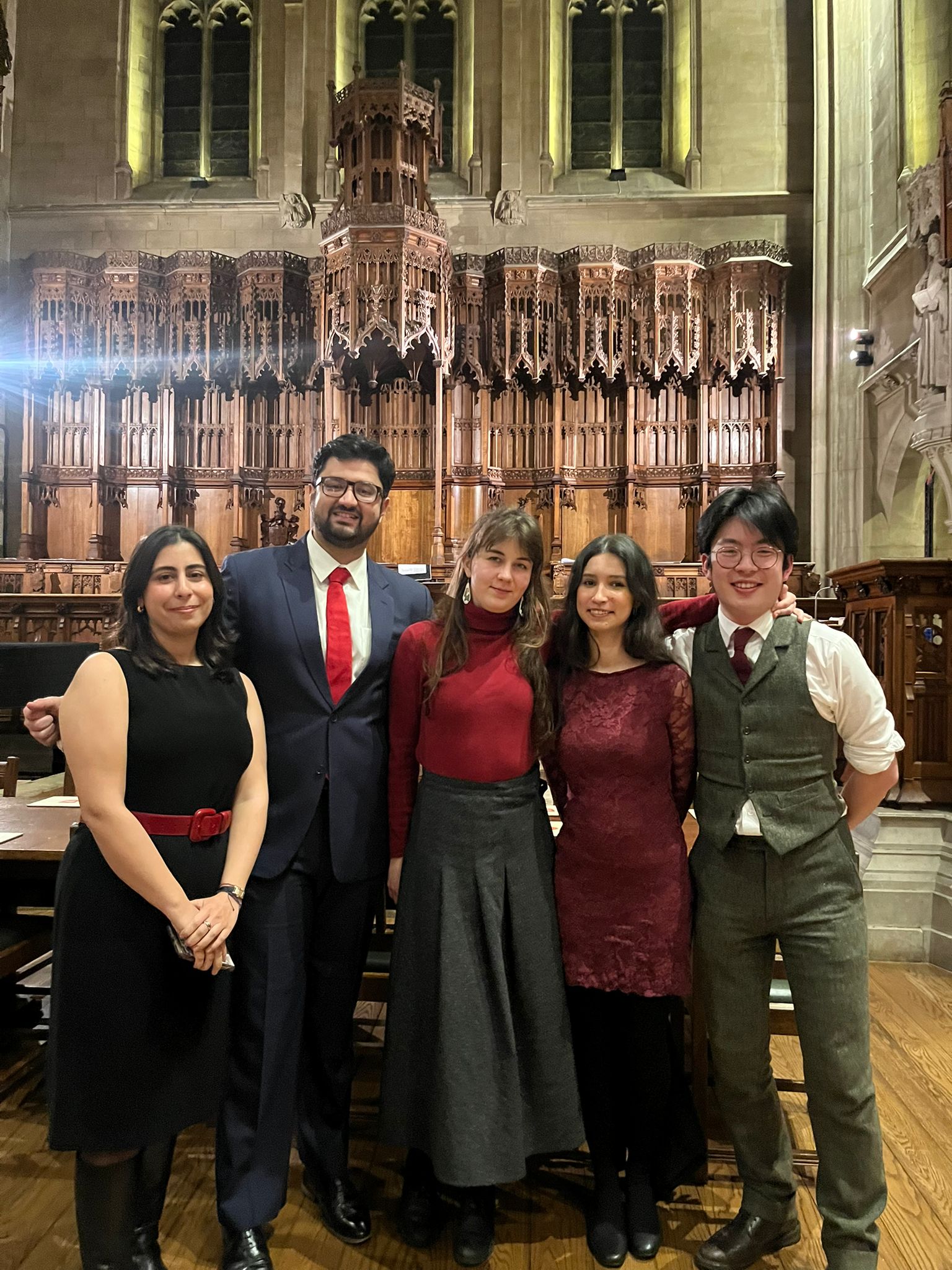
 My first time doing a proper masquerade – I pushed Alec to make this the bop theme.
My first time doing a proper masquerade – I pushed Alec to make this the bop theme.